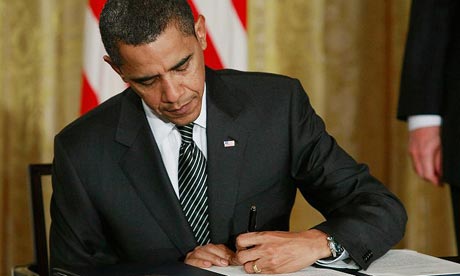US president Barack Obama is set to sign the bill on Tuesday. Photograph: Mark Wilson/Getty
Well, it finally happens. After much debate and revisions, both houses of Congress has passed the American Recovery and Reinvestment Act.
It's interesting that many newspapers have stated that this crisis has been one of the worst ever since the Great Depression. However, while reading the SF Chronicle this afternoon, I stumbled upon this interesting paragraph that I will quote:
The outcome amounted to the first significant fruits of November's Democratic victory, in which Obama handily won the presidency while his party expanded its congressional majorities. For the first time in 14 years, Democrats have the power to legislate without serious Republican interference, and Friday they reveled in what many described as a new dawn for liberalism.
This brought me back to a Time Magazine article that was written about a week after Obama's election victory titled: The New Liberal Order.
The article clearly defines this new era of liberalism as an end to the culture war between small-government conservatives, which was comprised of the silent majority (i.e. social conservatives or small-government conservatives) which came out during the 60s, and the very social-activist progressive group which seeked for change for the better. Unlike the disorderly, violent 60s with traditional liberalism, the new liberals want to see government regulate in a way which creates order in the economy while solving many problems in our society, whether it be social, economic, or technological issues.
I have turned progressive myself. Ironically, there are still Republicans in Congress who believe that this stimulus plan is too risky. I still wonder what solutions they can contribute (using the private sector as an excuse is pretty bad at this time).
The question is: how progressive can our generation get?
My US History teacher once said that American history's pivotal movements come out about every sixty years. She says: 1840 (about the time when the Democracy we have today comes out, i.e. Andrew Jackson. Although Jackson did stop being president before 1840) ,1900 (Progressive Era),1960 (Civil Rights Movement), and predicts 2020 will be the next famous year.
What will happen in 2020?
To end this post, here's the Time article's quote:
If he can do what F.D.R. did — make American capitalism stabler and less savage — he will establish a Democratic majority that dominates U.S. politics for a generation.





No comments:
Post a Comment